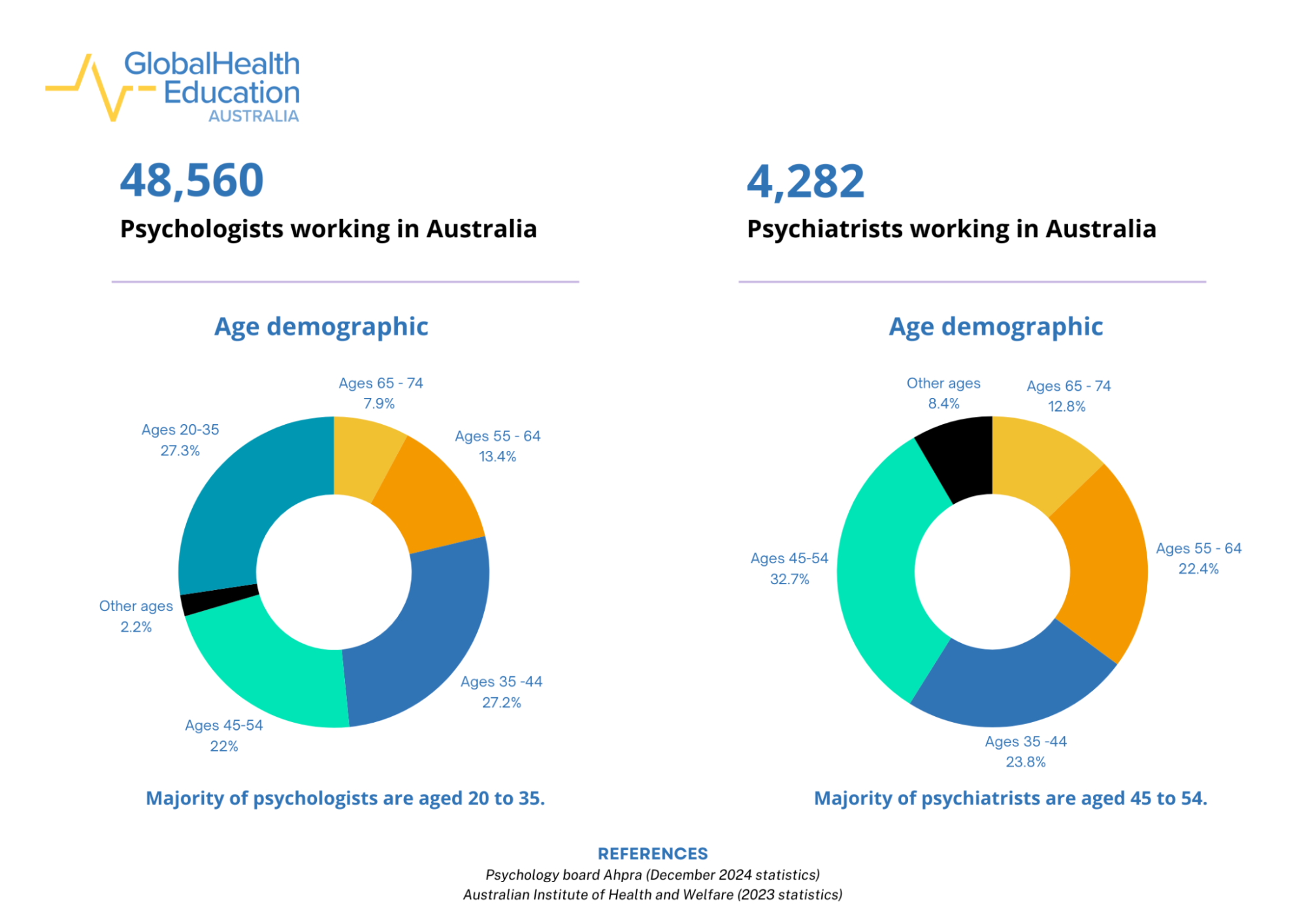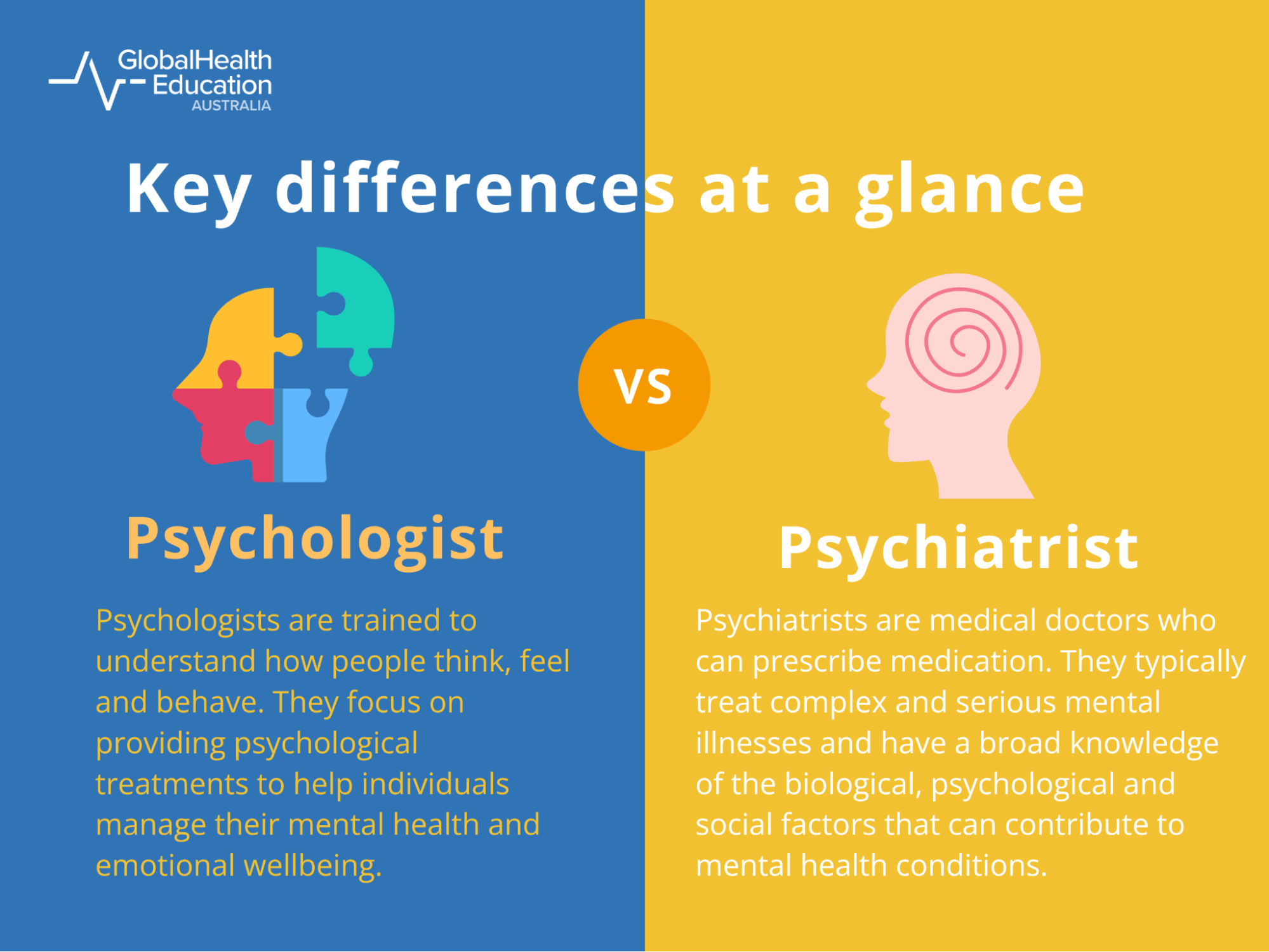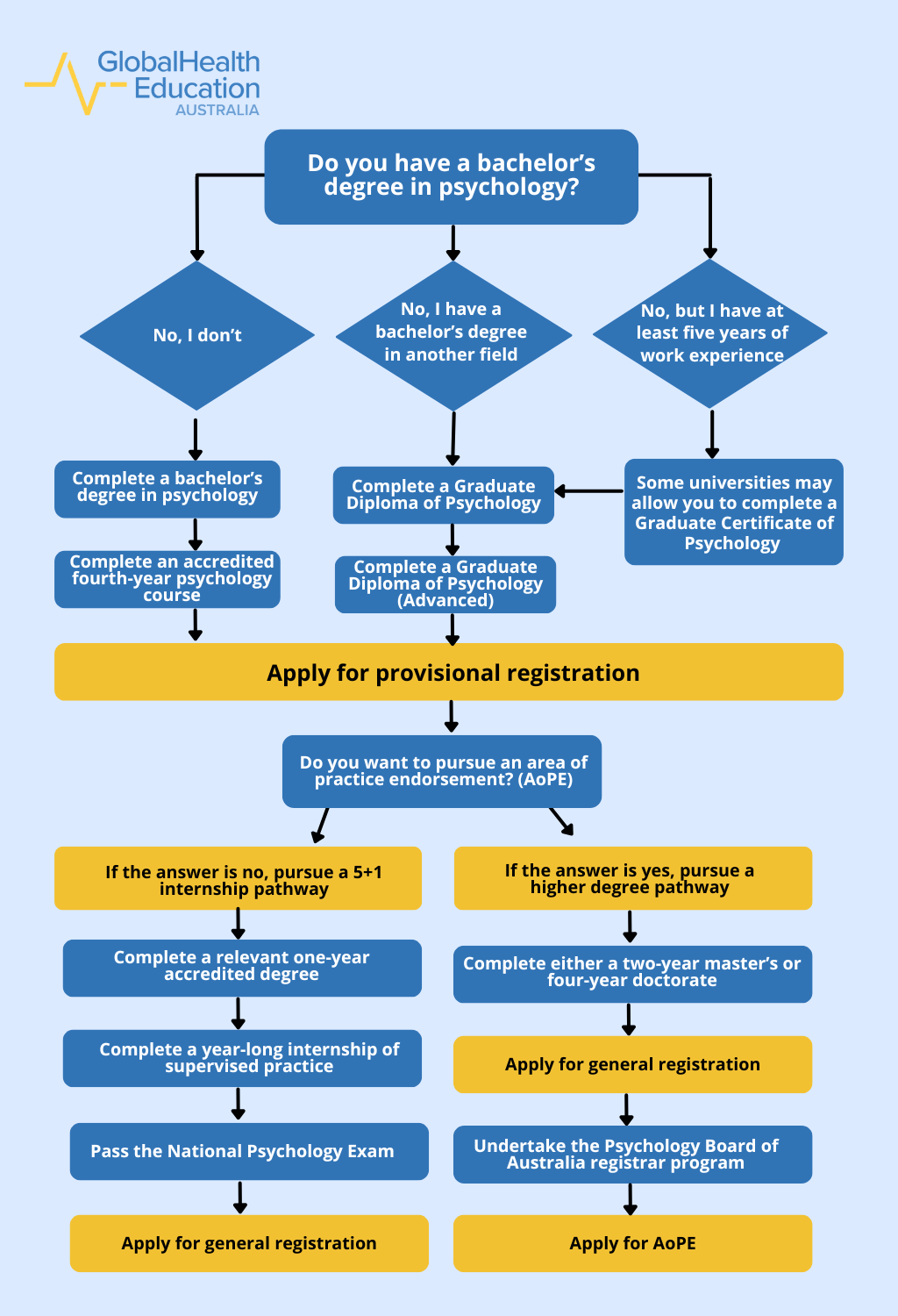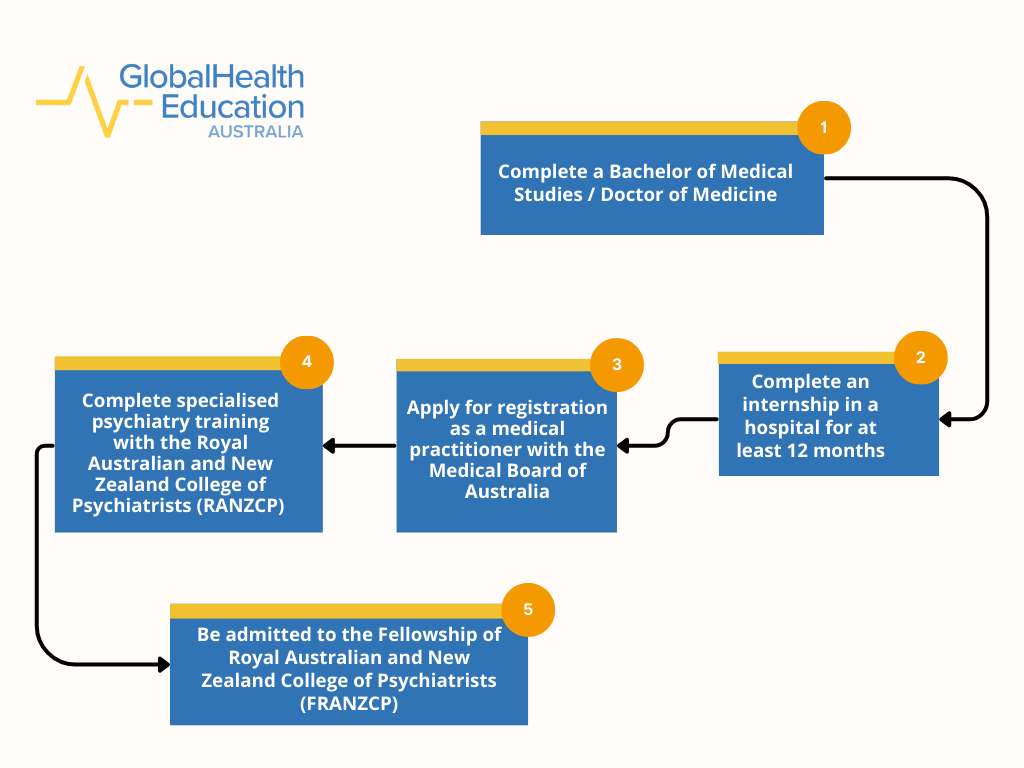In This Article
- Psychiatrist vs psychologist: data at a glance
- Psychiatrist vs psychologist: roles and responsibilities
- Psychiatrist vs psychologist: salary
- Psychiatrist vs psychologist: qualifications
- How to become a psychiatrist or a psychologist?
- Should I become a psychologist or psychiatrist?
- Key differences summed up between a psychologist vs psychiatrist in Australia
- Choosing the path that’s right for you

When it comes to mental health careers, psychology and psychiatry are often mentioned in the same breath, especially since they both have “psych” in their name. While both professions are dedicated to improving mental wellbeing, they differ significantly in education and training, how they work with clients or patients and the type of care they provide.
If you’re unsure of which profession to pursue, this article will break down the key differences in areas such as roles and responsibilities, education and salary so you can make an informed decision of which career path to take.
Psychiatrist vs psychologist: data at a glance

Psychiatrist vs psychologist: roles and responsibilities
While both psychologists and psychiatrists are integral to mental health care, there are some distinctions in their roles and responsibilities.

What do psychologists do?
Understand behaviour and emotions
Psychologists are adept at understanding human behaviour and their role centres around helping clients manage their emotions through a variety of approaches such as talk therapy and evidence-based therapeutic techniques.
Support a range of mental health challenges
They often work with individuals experiencing anxiety, depression, trauma and relationship difficulties and their primary goal is to help individuals cope with these issues to promote positive change and enhance overall wellbeing.
When psychologists may refer clients to psychiatrists
As psychologists do not prescribe medication and, instead, focus on helping clients manage symptoms through non-medical approaches, they may refer clients to a psychiatrist if medication may be required.
As Luke Lawrence, director and principal psychologist of Geelong-based private practice Explore Psychology, explains, “If I was working with a client who had a particularly resistant form of depression or anxiety that wasn’t responding to therapy alone, I might suggest that they book in to see a psychiatrist who can advise them on appropriate medications.”
Key responsibilities
Providing support through therapeutic interventions
A psychologist’s day is usually filled with a series of one-on-one or group appointments where the focus is on providing support through therapeutic interventions such as cognitive behavioural therapy (CBT) or acceptance and commitment therapy (ACT).
An individual session, for example, might involve working with someone through trauma or a relationship breakdown and consist of helping the client identify thought patterns, regulate their emotions and implement practical coping strategies.
Group sessions, on the other hand, may consist of individuals dealing with challenges like social anxiety or ADHD, with the psychologist facilitating discussions, guiding therapeutic activities and fostering peer support.
Additional responsibilities
Beyond client-facing work, psychologists are also responsible for continuing professional development (CPD), reviewing session notes, conducting research and handling administrative tasks.
💡 Want to learn more about what a psychologist does? Discover what a day in the life of a general psychologist looks like here.
What do psychiatrists do?
Medical assessment and treatment
Psychiatrists are medical doctors who specialise in diagnosing and treating mental health conditions. Unlike psychologists, they can prescribe medication and are trained to assess the complex interplay between mental, physical and neurological health.
Psychiatrists often work in collaboration with other healthcare professionals and their work involves evaluating a person’s symptoms through a medical lens, considering family history, underlying health conditions and possible biochemical factors that may contribute to a mental illness. They can order tests, monitor how medications are affecting the patient and adjust treatment accordingly.
For individuals facing persistent or severe mental health concerns, psychiatrists may also coordinate hospital admissions and provide specialist care.
Key responsibilities
A psychiatrist may typically begin their day reviewing test results or medication charts for patients under their care.
Conducting psychiatric evaluations
The day could then involve meeting with a new patient referred for severe depression. During the consultation, the psychiatrist will conduct a comprehensive psychiatric assessment, which typically includes evaluating symptoms and asking questions about the patient’s medical and family history.
Developing treatment plans
After which, the psychiatrist will work out a treatment plan which may include a combination of therapies such as medication, psychological treatments and brain stimulation therapies. Their medical training also equips them to identify when physical health issues may be contributing to mental health symptoms and to coordinate care with GPs or specialists if needed.
Ongoing treatment and reviews
Throughout the day, a psychiatrist will likely see several other patients, where they will review symptoms and adjust treatment plans as needed. Some of the complex mental health issues that they may work with include individuals experiencing hallucinations, suicidal thoughts or complex conditions like bipolar disorder and schizophrenia.
In addition to clinical responsibilities, psychiatrists may also be involved in research, supervision of junior doctors or trainees, and teaching and contributing to the development of mental health services or policies.
When psychiatrists may refer patients to psychologists
While psychiatrists may provide ongoing psychological treatments themselves, they may refer patients to psychologists if they require regular sessions, longer-term counselling or specialised therapeutic approaches. They may also refer patients for detailed psychological assessments or to support a more holistic treatment plan alongside medication.
In many cases, psychiatrists and psychologists also work together to provide coordinated care, sharing insights and approaches to ensure the best outcomes for the client or patient. As Luke shared, “I’ve worked with a couple of psychiatrists to exchange thoughts about a mutual client, discussing what’s working from a psychotherapeutic approach and their views on what medications might be recommended.”
Psychiatrist vs psychologist: salary
Psychologist salary
How much a psychologist earns can vary based on factors such as level of experience and what type of psychologist they are. For example, psychologists generally make an annual salary of between $100,000 to $110,000 in Australia, however, clinical psychologists typically make more with an average annual salary ranging from $110,000 to $120,000.
Location also plays a role. According to SEEK, psychologists in Tasmania earn the most with an average annual salary of around $115,000 while psychologists in South Australia earn the least with an average annual salary of $97,000.
Psychiatrist salary
Similar to a psychologist, a psychiatrist’s salary can also vary depending on factors like location and experience. According to SEEK, psychiatrists in Australia earn an average annual salary of between $200,000 and $220,000. However, those working in private practice or locum roles may earn significantly more.
As an example, in early 2025, over 200 psychiatrists in the New South Wales public health system threatened to resign, citing a widening pay gap between public and private sectors, reportedly as high as 30 to 50 per cent. As of April 2025, the issue remains ongoing but highlights that there can be a significant difference in earning potential depending on the setting.
Psychiatrist vs psychologist: qualifications
What qualifications do psychologists need?
Becoming a psychologist in Australia typically takes around six to seven years, depending on whether you’re aiming to become a general registered psychologist or specialise in a particular area of practice. Each pathway has slightly different qualification requirements.
💡 Read our step-by-step guide on how to become a psychologist here.
General registration pathway
To become a general psychologist, you’ll need to complete the following:
- An undergraduate degree in psychology
- An accredited fourth-year psychology course (e.g. honours or graduate diploma)
- Apply for provisional registration with the Psychology Board of Australia
- A relevant one-year APAC-accredited postgraduate degree
- A one-year internship of supervised practice
- Pass the national psychology exam
Area of practice endorsement pathway
To become a psychologist with a specialisation in areas such as clinical psychology or organisational psychology, you’ll follow the same steps up to provisional registration before pursuing a higher degree pathway, which involves:
- Completing either a two-year master’s or four-year doctorate
- Undertaking the Psychology Board of Australia registrar program
- Applying for an area of practice endorsement
💡 Learn more about general registration vs practice endorsement here.
What qualifications do psychiatrists need?
It typically takes a minimum of 11 years to become a psychiatrist. You’ll need to:
- Complete an accredited medical degree such as a Bachelor of Medical Studies / Doctor of Medicine
- Undertake a one-year internship before registering with the Medical Board of Australia
- Apply to the Royal Australian and New Zealand College of Psychiatrists (RANZCP) to begin five years of specialist training in psychiatry
- Be admitted to the Fellowship of Royal Australian and New Zealand College of Psychiatrists (FRANZCP) upon successful completion of training
How to become a psychiatrist or a psychologist?
How to become a psychologist?
The flow chart below outlines the key steps to becoming a registered psychologist in Australia.

Take your first steps
Not sure where to begin? Here are some options to get you started:
Don’t have a degree yet?
Start with an accredited undergraduate program like a Bachelor of Science in Psychology to be introduced to the latest theory, practice and research in a diverse range of areas of psychology.
Already have a degree in another field?
Fast-track your entry into the field by pursuing a Graduate Diploma of Psychology at Edith Cowan University, a Graduate Diploma of Psychology (Bridging) at James Cook University or a Graduate Diploma in Psychology at the University of Technology Sydney.
No degree but have work experience?
Some courses, such as the Graduate Certificate of Psychology at Edith Cowan University, may accept professional experience as an entry requirement.
The courses below are listed by qualification level, from lowest to highest.










How to become a psychiatrist?
The flow chart below outlines the key steps to becoming a psychiatrist in Australia.

As seen above, becoming a psychiatrist takes several years of dedicated study and training. Completing a Bachelor of Medical Studies / Doctor of Medicine can take up to six years and specialised psychiatry training through the RANZCP typically takes a minimum of five years.
During the training, you will work in hospitals and clinics under the supervision of experienced psychiatrists, rotate across different areas of practice such as addiction, adult psychiatry and child and adolescent mental health, complete workplace assessments, undertake clinical and written exams and longer research subjects and complete a formal education course.
Should I become a psychologist or psychiatrist?
So, which career path is right for you? It all comes down to your interests, strengths and how you see yourself helping others. A few things to ask yourself include:
What are your interests?
Are you someone who’s always been intrigued by why people think and feel the way they do? Maybe you naturally tune into the emotional experience of others, picking up subtle changes in mood or body language, or often find yourself trying to understand the “why” behind someone’s actions. If these are all things that you resonate with, you may be well-suited to becoming a psychologist.
On the other hand, if you’re someone who’s interested in knowing more about the human body such as how the human brain works, how physical and mental health are connected and how medical knowledge can support recovery, psychiatry might be a better fit.
How do you want to help others?
Many psychologists work in the profession because they value connection, often working with clients over extended periods, helping them understand and process their experiences, navigate challenges and build long-term strategies for emotional wellbeing.
As Luke states, “Some psychologists don’t like to approach their work clinically. They love to build relationships and value partnering with their clients through their journey for better mental health rather than over-medicalise the problem For psychiatrists, however, there is an emphasis on the biology of mental health. Neurology is probably a better term as they really consider what’s going on in the brain medically, as opposed to psychologists who often focus on a fundamental – or holistic – understanding of overall functioning.”
Psychiatrists also work with people to support their mental health, but their focus is more often clinical. They may spend time assessing symptoms, refining diagnoses, prescribing medication or adjusting treatment plans. While some psychiatrists also offer therapy, many work alongside psychologists to coordinate care.
Are you interested in becoming a medical doctor?
If you’d like to undertake medical training and use your knowledge of the body, brain and medicine to treat mental illness, psychiatry could be the right fit for you. Psychiatrists are fully qualified doctors who study medicine before specialising in psychiatry and the training equips them to understand the biological, psychological and physical factors contributing to mental health conditions.
On the other hand, while becoming a psychologist still involves years of study, it focuses on human behaviour, emotions and therapy rather than clinical medicine. If you’re passionate about understanding people and supporting their emotional wellbeing but not necessarily interested in becoming a medical doctor, psychology may be a better fit for you.
What do you want your day-to-day work to look like?
Psychologists tend to spend most of their time in one-on-one or group sessions, applying therapeutic frameworks and adjusting treatment approaches as clients progress. Their work often involves deep diving into each client’s thoughts and emotions, taking detailed case notes and at times, collaborating with other professionals.
Psychiatrists, depending on the setting, may have more structured appointments focused on assessing symptoms, prescribing medication and monitoring clinical progress. Their day may also involve reviewing referrals, coordinating hospital admissions or consulting with other healthcare providers.
If you’re looking for a highly relational role rooted in conversation and long-term support, psychology may suit you better. If you’re more interested in analysing symptoms, adjusting treatments and approaching mental health through a medical perspective, psychiatry might be a better fit.
What kind of environment do you want to work in?
Psychologists work in a wide range of environments from private practice and schools to hospitals, community centers and workplaces. The flexibility in work setting is one of the profession’s appeals.
Psychiatrists, on the other hand, are more often based in medical or hospital settings, working alongside GPs, nurses and other healthcare professionals. While both roles can work in private practice, psychiatrists are more likely to work in acute or inpatient care, particularly when managing more severe or complex cases.
Where do your strengths lie?
Your personality and strengths can also offer valuable clues as to which profession might be a better fit. If you’re someone who is naturally empathetic, patient, emotionally perceptive, enjoys meaningful connections, values connection and enjoys listening to others and helping them reflect, you may be well-suited to a career as a psychologist.
On the other hand, if you’re curious, methodical, have strong analytical thinking skills, enjoy solving complex problems and have deep interest in areas like biology and chemistry or how the body functions, psychiatry could be the right fit.
💡 Not sure what your personality type is? Take our quiz here.
Which path should you choose?
Ultimately, which path you should choose comes down to personal preference. If you’re curious about human behaviour, value one-on-one connection and want to support people through therapeutic interventions, psychology could be the career for you.
If you have a strong interest in science and medicine and want to treat mental health conditions from a clinical and biological perspective, psychiatry could be the better fit.
As Luke advises, “If your emphasis in your career is to build relationships with clients and journey with them using evidence-based psychotherapy rather than medicine, then psychology is probably for you. Whereas if you’re more scientifically or medically focused, then I would suggest psychiatry.”
Key differences summed up between a psychologist vs psychiatrist in Australia
| Category | Psychologist | Psychiatrist |
|---|---|---|
| Roles and responsibilities | Focuses on understanding human behaviour and providing long-term emotional support through therapeutic interventions and coping strategies. | Medical doctors who can prescribe medication. They conduct psychiatric evaluations, develop treatment plans and can coordinate hospital admissions if needed. |
|
Salary |
Generally earns between $100,000 to $110,000 annually in Australia. | Earns between approximately $200,000 to $220,000 annually in Australia. |
|
Qualifications |
Takes approximately six to seven years. Involves completing an undergraduate degree, an accredited fourth-year psychology course and a choice between pursuing a 5+1 internship or a higher degree pathway. |
Takes approximately 11 years. Requires completing an accredited medical degree, a one-year internship and specialist training in psychiatry through the RANZCP. |
|
Work environment |
Can work across diverse settings including private practice, schools, hospitals, community health services and workplaces. |
Works primarily in medical settings such as hospitals and clinics. Can also work in private practice, academic and research and community mental health services. |
|
Specialisations |
Includes clinical, educational and developmental, forensic, health, organisational, sport and exercise psychology and clinical neuropsychology. |
Includes addiction, older individuals , child and adolescent, forensic, perinatal and infant psychiatry, neuropsychiatry and psychotherapy. |
Choosing the path that’s right for you
While psychologists and psychiatrists are both vital to the mental health field, they’re distinctly different. While psychologists work closely with clients over time to support emotional wellbeing through therapy, psychiatrists take a clinical approach, combining medical expertise with mental health care to diagnose and treat more complex conditions.
If you’re considering a career in psychology, our university partners at GlobalHealth Education offer a range of psychology courses to help you take the first step.
If you’re still deciding which path is right for you or you’re unsure of where to start, book a free professional development strategy call with our Education Consultant who can help you explore your options.


















